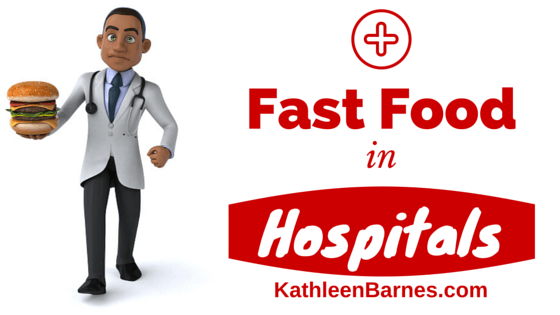About 20 years ago, I was in an Atlanta hospital for knee surgery. As I was lolling the bed, fairly buzzed with pain meds, my husband arrived for a visit carrying a McDonald’s bag.
“Where did you get that?” I asked.
“In the lobby.”
“What??!!??” I asked, mercilessly jerked out of my reverie.
Right. A well-respected Atlanta hospital was pushing fast food straight out of its lobby.
Well, I recovered sufficiently to go on one of my rampages, I started a letter writing campaign to anyone at the hospital who would listen. The patient ombudsman, the CEO, the hospital administrator.
“Are you trying to bypass the middle man and just have patients transported directly from McDonald’s to the ER?” I asked.
I got only one response from the patient ombudsman: “The pay us good money.”
Fast-forward 20 years. There are positive signs. Most hospitals now ban tobacco on their campuses. I remember the days when we had to run a gauntlet of hospital staff and patient families just to get in the door.
But there are also extremely negative signs. A recent study shows that one in three children’s hospitals host fast food outlets of one type or another, including Krispy Kreme.
Florida and Texas lead the way with the most fast food restaurants in their hospitals, many of them advertising in elevators and one in Georgia offering “McDelivery” to patients’ hospital rooms and even hosts birthday parties in hospitals.
The Physicians Committee for Responsible Medicine (PCRM) recently published a map of McDonald’s restaurants in hospitals. It’s not really surprising that the fast-food franchises in hospitals are mostly in the southeast, the geographic area with the highest concentration of obesity.
It’s not just McDonald’s. You can get Wendy’s and Chick-fil-a almost as easily.
PCRM cites on particularly disturbing example of hospital as being incentivized to help fast food restaurants sell more junk food.
Money talks.
The contract between McDonald’s and Ben Taub General Hospital in Houston allows Mickey D’s to terminate its lease if its in-hospital sales are less than $1 million a year. What’s more, the yearly rent the fast food chain pays to the hospital increases as its sales increase.
Cardiologist Aseem Malhotra of the Royal Free Hospital in London criticized these controversial hospitals in a June 2013 article published in the British Medical Journal. “The junk food industry’s aggressive and irresponsible marketing has even been allowed to hijack the very institutions that are supposed to set an example: our hospitals,” he wrote.







